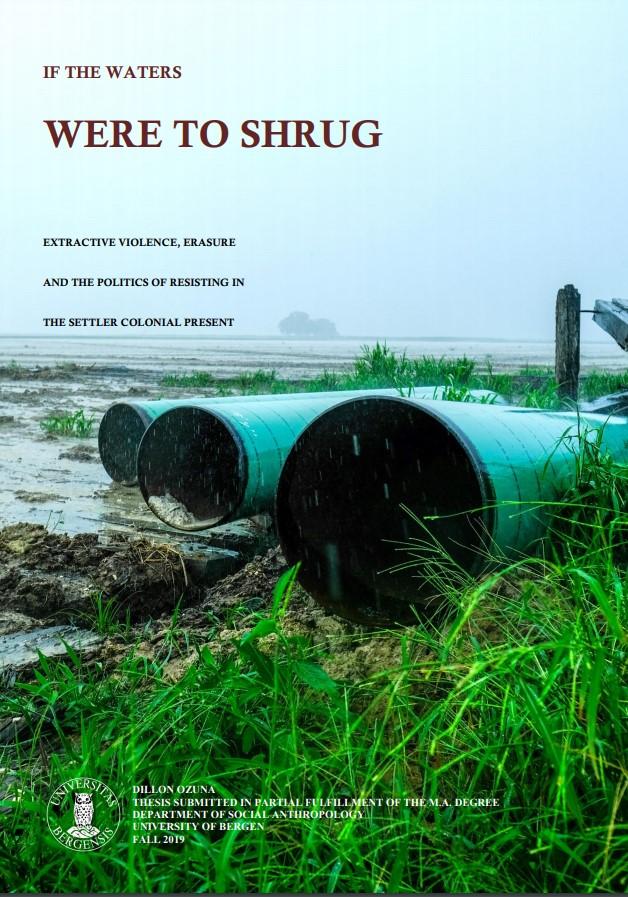If The Waters Were To Shrug: Extractive Violence, Erasure and the Politics of Resisting in the Settler Colonial Present
Hovedinnhold
Master's thesis submitted at Department of Social Anthropology, autumn 2019.
By: Dillon Ozuna
Supervisor: Associate Professor Kerry Chance
This thesis is based on my multi-sited fieldwork (January–September 2018) surrounding an anti-pipeline resistance camp led by four indigenous women in southwest Louisiana opposing the new Bayou Bridge Pipeline; the southward extension of the controversial Dakota Access Pipeline that spurred mass protests at Standing Rock from mid-2016 to early-2017. The four women are of Diné and Cherokee, Sicangu Lakota (Sioux), Choctaw, and Houma descent respectively. The Bayou Bridge Pipeline, financed by banks such as Norway’s DnB, would transport crude oil to the black church community of St. James—an impoverished community long inundated with toxic pollution in one of the most densely industrialized regions in the Western Hemisphere, named Cancer Alley—for the manufacturing of plastics and various consumer commodities.
The women operate as allies to the black community of St. James and other Cancer Alley communities who are themselves stark opponents of the pipeline, highlighting solidarity across marginalized social groupings. The allies of these women that I lived among and studied hail from other indigenous communities across the country, while others that I lived among are non-indigenous sympathizers with politics that are primarily leftist-oriented or anarchistic. As such the combined politics of those that I studied are mainly anti-capitalist and anticolonial.
Throughout the thesis, I explore the politics of water mobilized by activists—i.e. a politics focused on rights to clean-water as well as aimed at protecting surrounding environments that communities depend on— examining primarily how they employ their politics of water as a vehicle to resist what they perceive as settler-colonial processes of dispossession engendered by projects of the fossil fuel industry, the US government and the Louisiana government in the present.
I combine theories from resistance studies, social movement studies, environmental studies, political anthropology, linguistic anthropology, gender studies, kinship studies, indigenous studies and settler colonial studies, a sub-field of indigenous studies that analyzes phenomena pertaining to settler colonialism, to examine the mobilizations of these activists and the overarching power dynamics, i.e. the political corruption and the structural relations that promote the construction of this pipeline network, against which they employ various forms of resistance.
Using various news articles and the work of investigative journalists, I examine the discursive landscape surrounding the activists and this pipeline. Moreover, I use life-histories and lived-experiences from qualitative interview material, ethnographic scenarios and field-notes to examine the turmoil of the contemporary United States, the everyday lived-realities of activists here as low-income citizens, people of diverse ethnicities and women of diverse backgrounds in a society that since president Trump’s inauguration in 2017 has steadily become more alienating and hostile toward the intersecting social groupings of these activists. As the thesis explores, their lives are subject to diverse modes of oppression and domination connected to industrial projects and pollution. Any mistakes written in the thesis are my own. Keywords: resistance; water; politics; environment; settler colonialism; indigenous; pollution; dispossession; anti-capitalism; anti-colonialism.
